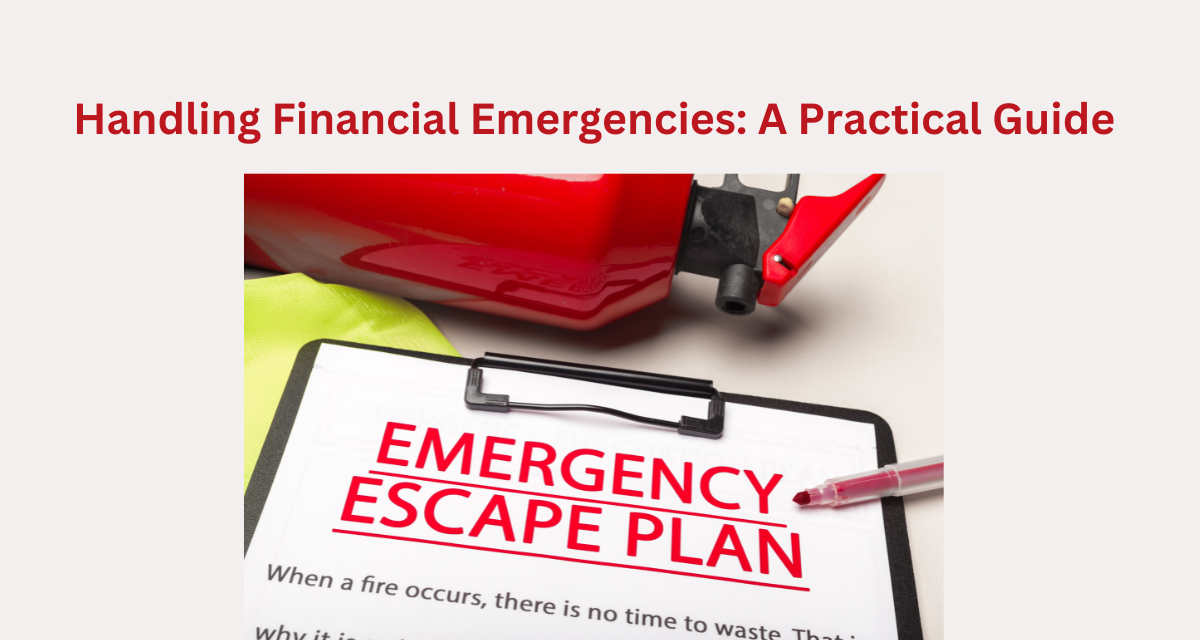Financial emergencies can strike when you least expect them, causing stress and uncertainty. This comprehensive guide is designed to help you navigate unexpected financial crises with confidence. Whether it’s a medical bill, car repair, or sudden job loss, you’ll find valuable insights and strategies to manage and overcome these challenges.
Table of Contents
1. Introduction to Financial Emergencies
- Understanding Financial Emergencies
- The Importance of Preparation
2. Types of Financial Emergencies
- Medical Expenses
- Unexpected Repairs
- Job Loss
- Natural Disasters
- Legal Issues
3. Assessing the Situation
- Gathering Information
- Evaluating Immediate Needs
- Identifying Available Resources
4. Creating an Emergency Budget
- Essential vs. Non-Essential Expenses
- Prioritizing Payments
- Cutting Costs
5. Exploring Financial Assistance Options
- Emergency Funds
- Personal Loans
- Government Assistance Programs
- Charitable Organizations
6. Negotiating with Creditors
- Communicating with Creditors
- Requesting Payment Extensions
- Debt Consolidation
7. Emergency Savings and Future Planning
- Building an Emergency Fund
- Financial Planning for the Future
- Insurance Coverage
8. Coping with Emotional Stress
- Managing Stress and Anxiety
- Seeking Support
- Mental Health Resources
9. Legal and Tax Considerations
- Legal Implications of Financial Emergencies
- Tax Strategies for Relief
10. Recovery and Rebuilding
- Rebuilding Your Finances
- Learning from the Experience
- Preparing for Future Emergencies
11. Conclusion
Introduction to Financial Emergencies
Understanding Financial Emergencies
Gain insight into what constitutes a financial emergency and how it can impact your life.
The Importance of Preparation
Learn why being prepared for financial emergencies is essential for financial stability.
Types of Financial Emergencies
Medical Expenses
Understand the financial challenges associated with unexpected medical bills and healthcare costs.
Unexpected Repairs
Explore the financial implications of sudden home or vehicle repairs.
Job Loss
Learn how to cope with job loss and navigate the financial uncertainties that follow.
Natural Disasters
Discover how to prepare for and recover from financial setbacks caused by natural disasters.
Legal Issues
Understand the financial implications of legal matters and how to manage associated costs.
Assessing the Situation
Gathering Information
Learn the importance of gathering accurate and up-to-date financial information.
Evaluating Immediate Needs
Prioritize your immediate financial needs to address the most pressing issues first.
Identifying Available Resources
Explore the resources available to you, including savings, assets, and support networks.
Creating an Emergency Budget
Essential vs. Non-Essential Expenses
Distinguish between essential and non-essential expenses to create a realistic emergency budget.
Prioritizing Payments
Learn how to prioritize bills and financial obligations during a crisis.
Cutting Costs
Discover practical strategies for reducing expenses during a financial emergency.
Exploring Financial Assistance Options
Emergency Funds
Understand the importance of having an emergency fund and how to access it.
Personal Loans
Explore the option of personal loans and how they can provide short-term financial relief.
Government Assistance Programs
Learn about government programs that offer financial assistance during emergencies.
Charitable Organizations
Discover how charitable organizations can provide support during times of need.
Negotiating with Creditors
Communicating with Creditors
Understand how to communicate with creditors effectively and transparently.
Requesting Payment Extensions
Learn how to request payment extensions and negotiate favorable terms.
Debt Consolidation
Explore debt consolidation as a potential solution for managing multiple debts.
Emergency Savings and Future Planning
Building an Emergency Fund
Discover the steps to build and maintain a robust emergency fund.
Financial Planning for the Future
Explore long-term financial planning to safeguard against future emergencies.
Insurance Coverage
Understand the role of insurance in protecting your finances from unexpected events.
Coping with Emotional Stress
Managing Stress and Anxiety
Learn strategies for managing the emotional stress that often accompanies financial crises.
Seeking Support
Discover the importance of seeking support from friends, family, and professionals.
Mental Health Resources
Explore mental health resources and services available to help you cope with stress.
Legal and Tax Considerations
Legal Implications of Financial Emergencies
Understand the legal aspects of financial emergencies and how they can impact your finances.
Tax Strategies for Relief
Learn about tax strategies that may provide relief during and after a financial emergency.
Recovery and Rebuilding
Rebuilding Your Finances
Discover the steps to take when recovering from a financial emergency and rebuilding your financial stability.
Learning from the Experience
Reflect on the lessons learned from the financial crisis and how to apply them in the future.
Preparing for Future Emergencies
Explore strategies for proactive financial planning to mitigate the impact of future emergencies.
Conclusion
Financial emergencies can be daunting, but with the right knowledge and preparation, you can effectively navigate these challenges. This guide empowers you to take control of your financial well-being during times of uncertainty, ensuring a more secure and resilient financial future.










